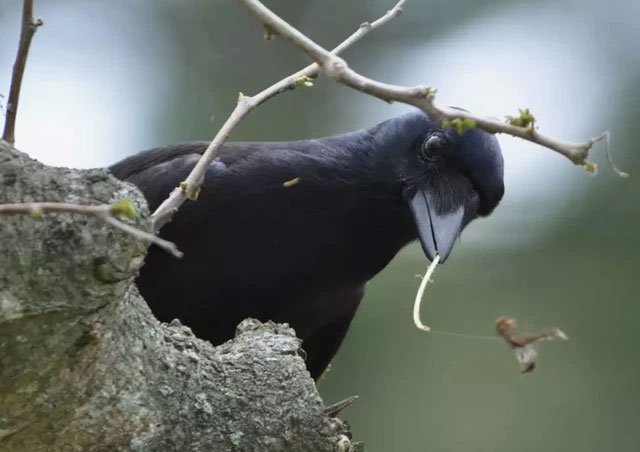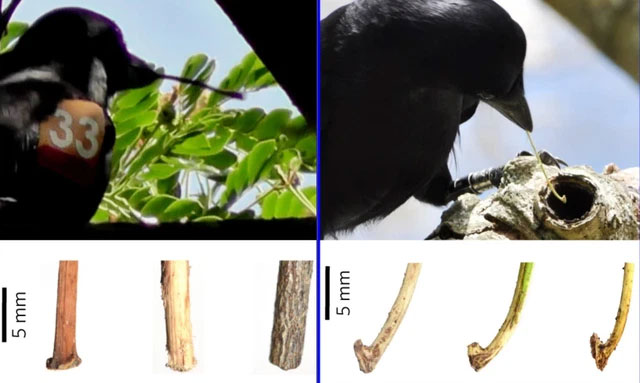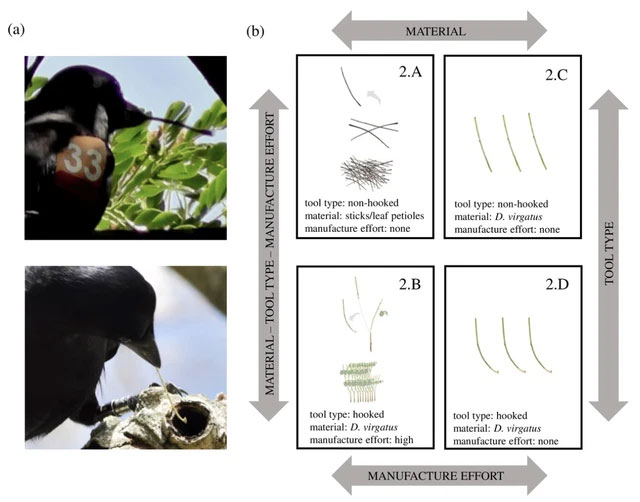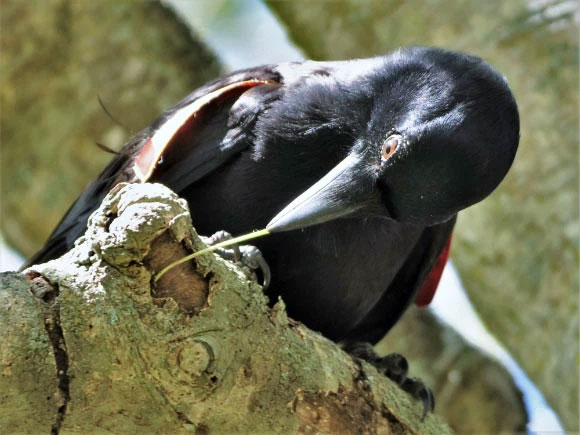Crows are among the smartest bird species, capable of finding ways to use tools for their own purposes. A recent study has shown that crows are also aware of the value of tools, much like humans.
Ecologist Barbara Klump from the Max Planck Institute in Germany stated: “Many of us are very careful when using a new phone, ensuring it doesn’t get scratched, dropped, or lost, but we handle an old phone with a cracked screen carelessly. Crows are similar in this regard.”

New Caledonian Crow.
The New Caledonian Crow (Corvus moneduloides) is renowned for its intelligence, to the extent that scientists have used them as a model to help unravel the evolution of tool use and related behaviors such as planning.
These intelligent crows can not only use found objects as tools, but they can also shape or even create tools from various individual parts, a skill previously observed only in primates.
In the wild, they use twig tools carefully held in their beaks to probe for insects hiding safely in tree holes. The insects will bite the tool as a defense mechanism, and the crow will then withdraw the twig and feast on the morsel it has just “caught.” However, crows must put their tools down while eating, which means the tools can fall to the ground or even be stolen, prompting them to devise ways to hide their tools if they are valuable items.

Crows can find ways to use tools for their own purposes.
The researchers tested 27 crows they captured from the wild to ensure they had never been trained. They provided two tool options, and the research team confirmed that the crows preferred to use hooked twigs as tools compared to straight twigs.
Ecologist Christian Rutz from St Andrews University explained: “Although hooked tools are harder to find, they are much more effective. Crows can catch prey with these tools ten times faster than with unhooked tools.”
Subsequently, the birds were observed in two trials, each on separate days. In both, they were presented with logs featuring holes of different sizes, containing bait such as meat or spiders. In one trial, they used hooked twigs, and in the other, straight twigs.
They found that the crows exhibited behavior to safeguard their tools when using the hooked twigs, storing the tools under their feet or in holes to prevent them from falling or being stolen by other crows, while they showed less concern when using straight twigs.

Crows will exhibit behavior to safeguard their tools when using hooked twigs.
Crows can pick straight twigs from various locations, but sometimes they have to find ways to extract hooked twigs from larger branches.
This behavior persists even when they use provided tools, indicating that crows recognize which tools are more valuable based on their utility, rather than the time spent searching for them. They have frequently used the safest method of storing tools in holes, especially for hooked twigs.
Researcher James St Clair from St Andrews University stated: “It’s fascinating to see that crows are more careful with tools they know are harder to find and more effective. This may suggest that they have some concept of the ‘relative value’ of different types of tools.”
Crows have also been known for their ability to plan ahead, meaning they can prioritize the value of the tools they use.

Crows can prioritize the value of the tools they use.
For a long time, we have underestimated the capabilities of birds due to their relatively small brains, but physiological studies have shown that the dense distribution of their neurons compensates for size.
Continuous research reveals that these “modern-day dinosaurs” can perform behaviors we once thought were exclusive to humans. This demonstrates that intelligence is a complex trait that does not solely arise naturally with humans. Researchers even believe that if humanity were to disappear, highly intelligent bird species would be strong candidates to succeed us.


















































